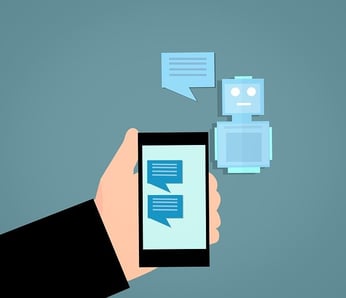Why Every B2B Company Needs A Chatbot

Automation and Artificial Intelligence (AI) technologies are rapidly changing the digital marketing landscape -- and chatbots are one of the most popular new developments. It is estimated that by the end of 2020, 80% of businesses will be using chatbots! Clearly, businesses recognize that chatbots can accelerate marketing and sales processes, and are jumping on the band-wagon.
What is a chatbot? A chatbot is software that is programmed to interact with users. It understands written text and can interpret user intent, so it can converse with users and answer their questions. A chatbot can automate many interactions with clients -- such as booking consultations -- making businesses more efficient.
You may be wondering whether chatbots have a place in b2b marketing. They are often thought to be more relevant to the b2c domain where the buyer cycle is shorter; someone about to purchase goods would obviously welcome instant answers.
 But once customers have been exposed to excellent customer service and a unique, engaging, and interactive experience when doing business -- well, they want to replicate that experience in every domain. In fact, currently 58% of companies currently using chatbot technology are B2B. Uptake of chatbots in the b2b industries is still slow though: only 1 in every 200 b2b companies actually has a chatbot. Implementing a chatbot would definitely give your company a competitive edge.
But once customers have been exposed to excellent customer service and a unique, engaging, and interactive experience when doing business -- well, they want to replicate that experience in every domain. In fact, currently 58% of companies currently using chatbot technology are B2B. Uptake of chatbots in the b2b industries is still slow though: only 1 in every 200 b2b companies actually has a chatbot. Implementing a chatbot would definitely give your company a competitive edge.
But is a chatbot really going to benefit your business? Let’s take a look at why they have become so popular, with customers and businesses alike.
WHY ARE CHATBOTS GOOD FOR BUSINESSES?
Check out this overview of 7 way chatbots are helpful for your business:
.png?width=800&name=Why%20Chatbots%20are%20awesome%20(1).png)
Let’s take a deeper look at why chatbots are so valuable.
- Improved customer service
Imagine your business could hire someone who is available 24/7, who can field multiple customer enquiries simultaneously, who always has all the right information at their fingertips, and who never gets tired of answering the same questions over and over again. Well you may never find that dream employee, but a chatbot can do all these things and more!
Even with great employees, most small and medium sized businesses don’t have the kind of manpower that can provide round the clock responses to inquiries; having a chatbot enables you to run your small business like a huge industry player.
A streamlined website could become overrun and chaotic if you try to answer every conceivable question that users may have on it. But you can feed these snippets of information to your chatbot so that they can provide responses to individual users, without overwhelming your customer base.
Chatbots can provide a personalized experience, as they have access to the users histories and preferences. Instead of moving between email and websites, bots can provide a frictionless experience for users, which translates to them perceiving your customer service as better.
- No waiting time means no lost leads
 If you ask most b2b marketers whether they are focused on lead generation and conversion, most will tell you that they have invested significantly in this area - creating relevant content, landing pages, optimized forms, email campaigns - but are they really capitalizing on all these potential leads?
If you ask most b2b marketers whether they are focused on lead generation and conversion, most will tell you that they have invested significantly in this area - creating relevant content, landing pages, optimized forms, email campaigns - but are they really capitalizing on all these potential leads?
According to Drift, a leading conversational marketing platform, the answer is a resounding NO. They point to results that were published in Harvard Business Review: If companies didn’t respond to leads in five minutes or less, they risked losing them forever.
But - you guessed it - 90% of the b2b companies they surveyed did NOT respond within this golden 5 minute window. Adding a chatbot ensures you don’t lose interested leads just because you didn’t respond quickly enough.
- Automation saves time, resources and allows you to scale your business
Chatbots can qualify leads, provide customer service and automate tasks such as booking appointments, consultation calls and giving quotes. Automation allows you to scale your business, and frees your staff to deal with the more complex interactions with clients.
Chatbots can save you money as well as time! Check out these statistics from Chatbots Life.

“ECommerce chatbot statistics show that businesses spend around $1.3 trillion on customer requests per year: With chatbot assistance, this expense could be reduced by 30%”
It’s clear that chatbots can help your business be efficient with it’s time, money and resources.
- It’s how the Millenials like to do business
According to MobileMarketer, 40% of millennials claim to engage with bots on a daily basis. Millenials like receiving instant answers to their questions, but they’re not choosing to pick up the phone
And it’s not just millenials: 56% of people would rather send a message than call customer service and 21% of users see chatbots as the easiest way to contact a business
It’s not just the information you are providing but how it is relayed. Today's customers prefer an interactive experience; even if the answer they are seeking can be found on your FAQ page, they prefer to engage in conversation.
- Identify qualified leads faster
Your chatbot can ask the user questions that establish whether they are a good prospect for your business. It can find out, for example, if their company size or type of industry is a good fit for the services you provide. When the chatbot identifies a hot lead, it can seamlessly redirect them to a human agent. This way, your staff are dealing with the most high quality leads, and they come armed with some vital background information too.
- Provide data, insights and ideas for business development
Your chatbot will hopefully be able to answer many of the questions your users pose, and gain valuable data about them along the way. For example, they can for demographic information, such as the users location or how many employees their business has. Businesses can gauge which services are most popular or valuable by looking at what their users are asking. Identifying the pain points of the users is a great way to get a more developed buyer persona.
 The questions asked by users may even generate ideas for your business! If you find that prospects are continually asking for a service that you don’t offer, that might give you the impetus to add that service to what your business offers - especially because you can be confident that this service is in demand! If your prospect had just been browsing your website and not found that service listed, you would never have known that it was something that interested in them. The conversational nature of a chatbot means you get to hear exactly what your prospective clients want.
The questions asked by users may even generate ideas for your business! If you find that prospects are continually asking for a service that you don’t offer, that might give you the impetus to add that service to what your business offers - especially because you can be confident that this service is in demand! If your prospect had just been browsing your website and not found that service listed, you would never have known that it was something that interested in them. The conversational nature of a chatbot means you get to hear exactly what your prospective clients want.
- Chatbots are the future marketing platform
Businesses usually associate chatbots with providing great customer service. But the reality is that the chatbot market is in its infancy and there are boundless possibilities to explore. Leslie Swanson, President and CEO of eXalt Solutions proposes that businesses think about chatbots as a key marketing platform. She asserts that we can already see the potential scope for wider applications of chatbots, and notes that:
- Open rates and click through rates for chatbots vastly outperform email, so chatbots could become the standard way to reach buyers
- Research shows that b2b buyers have less time to read and research. Imagine if white papers, case studies and spreadsheets were converted into interactive chatbots. A prospect reading a case study could immediately click to consult with a bot and receive personal analysis of how the case study relates to them, instead of trying to figure it out themselves.
- Businesses could capitalise on the chatbots drastically lower bounce rates by using them for their marketing surveys.
Even if your business is not ready to consider utilising a chatbot in this wider sphere of marketing, part of being competitive is recognising - and leveraging - up and coming business trends.
HOW DO CHATBOTS WORK?
There are two main types of chatbots, command-based chatbots, and AI based chatbots.
A command-based chatbot is the simpler type of chatbot but can still provide great virtual customer assistance. It is programmed to respond to users with pre-scripted answers.
What are key characteristics of a command-based chatbot?
- They start by asking the user a question, and are activated by direct commands.
- They understand the users written text and can interpret what information they are seeking. This understanding comes from template search and dynamic search.
- They operate using scripts and pre-written responses (as opposed to coming up with new texts).
- To answer a question, they match the query with an answer from their data-bank of replies.
- They are a great tool for providing straightforward answers to general inquiries such as explaining the services that your business provides.
- They are reliable and grammatically correct.
- They can’t reply to atypical questions or unprecedented situations that they haven’t been specifically coded for.
- Because they can ask questions too, they can establish whether the user meets the criteria of being a good potential client, and can fast track them to a human agent if necessary. The chatbots can also be programmed to redirect the user to a human if their query is beyond the scope of what they can answer.
An AI (Artificial Intelligence) based chatbot is far more sophisticated and provides a more unique experience for the user.
What are key characteristics of an AI chatbot?

- They create replies using natural language processing.
- Because they are ‘intelligent’, the question can be phrased more ambiguously and the chatbot will still be able to figure out what the user was asking.
- Their knowledge isn’t based on scripts and templates, so they can answer any questions.
- They are continuously developing.They record any interactions they have with users, and use these to become smarter and more efficient over time.
- According to Webuter Technologies, if you need to meet a very varied set of requirements from users, an AI chatbot is the best chatbot.
Which chatbot is right for your business?
While command-based bots and aI bots have very different characteristics, it can be difficult to work out which one better suits your business’s requirements.
Even if you are convinced that a chatbot could be beneficial for your business, you’re probably wondering how much this will cost!
According to Mobilemonkey.com, basic software platforms range from $50-$500 per month. This doesn't take into account all the costs that you will encounter but is a good example of a low-budget route. On the other end of the spectrum, Azati.ai claims that the average software company will charge $15-30,000 for a custom bot, with the most advanced ones costing up to $100,000!
Clearly, the price differential is huge, so if you are new to using chatbots, it may be smartest to start with a simple command based one while you figure out your needs. Not only are these free/ low cost (this can also depend on what software you are already using), they can also be programmed easily.
Aside from cost considerations, Inken Kuhlmann-Rhinow, Marketing Director, EMEA at HubSpot suggests another benefit to starting small. Defining simple manageable goals like handling simple customer inquiries allows you to introduce your chatbot to your customer base gently -- and test it out -- without risking alienating your customers.
Once you start analyzing the data from your chatbots, and how successful it is in meeting users needs, you will be able to determine whether a bigger investment in AI is justified. Even if you decide not to go the AI route now, it is worth knowing that it’s out there as the AI trend is definitely growing.
HOW TO CREATE A GREAT CHATBOT
While a chatbot can be great for your business, it needs to be implemented properly. The right research, design, and testing can make all the difference to whether your chatbot is successful.
How can you create a great user experience? Consider the following:
What questions should your chatbot be able to answer?
Talk to your company’s sales reps and customer service reps -- the people that speak to the customers directly -- to find out which questions are often asked. Make sure these can be adequately addressed by your bot. Consider the main goals you are hoping to achieve with your chatbot -- such as lead generation or improving customer service -- and design your chatbot to meet those objectives.
What are your users seeing? Consider the Visual Effect
Robert Toth suggests avoiding a huge block of texts as this can be overwhelming and monotonous. He recommends using emojis to break up the text, and testing how your app looks on different screen sizes to combat this. Adding buttons and other engaging visuals can also combat this monotony.
Use your chatbot to build your brand image
The language and tone your chatbot uses should reflect your distinctive brand voice, whether that’s more formal, chatty, helpful, or authoritative. Your chatbot’s ‘personality’ should resonate with your target audience.
Avoid being too robotic
Even though your user knows they are talking to a robot, you want the conversation to have a human feel. There should be some waiting time between responses so the conversation seems more natural. This also gives your reader a chance to digest the information being given. Even though your robot may use perfect spelling and always be grammatically correct, your user may not communicate so flawlessly. Ensure your bot is programmed to understand common mistakes and slang so your user doesn’t get frustrated by being misunderstood. Setting a default reply for when your bot doesn’t recognize the question is also vital.
Integrate your software
Industry experts recommend syncing your chatbot with your customer database so that you don’t end up overwhelming your lead with too many messages and repeated information. Your software can also be used to personalize the user experience. For example, the HubSpot Conversations tool allows you to target your chat flows according to segmented lists from your CRM. That way, you don’t end up re-asking your chatbot user for information you already have, and you can use your knowledge to give your user a customized experience.
Test it!
 Create multiple versions and A/B test them so that you can give your user the best experience, and ensure your chatbot is truly helping your business.
Create multiple versions and A/B test them so that you can give your user the best experience, and ensure your chatbot is truly helping your business.
Concluding thoughts
It can be difficult for businesses to distinguish between new marketing fads, and developments that are here to stay. The many advantages that chatbots can offer, coupled with the proliferation of AI technology suggests that the chatbots are not going away.
The innovative nature of chatbots has the power to revolutionize the way you engage with your clients, and allows you to provide better products and services. Since there are low cost (albeit less sophisticated) options for chatbots, you can try them out with majorly investing. Implementing even simple software allows you to see whether your business truly benefits from the upgrade, and whether chatbots resonate with your audience. Ultimately, chatbots are a stepping stone to a more digital, connected future -- a business trend worth pursuing.
Your Articles Need SkimCatchables
Skim-Catchables are bloggers' - now- not-so- secret weapon to make readers' jobs easier because they can easily skim down a page and find the answer to what they are looking for. Engaging titles and subtitles, gorgeous infographics, and functions like TL; DR (Too long; didn’t’ read) not only help readers, but should be part of any writer's tool kit!
Topic #customer relationship,#The Future of the Internet,#automation
Leave us
a Comment!